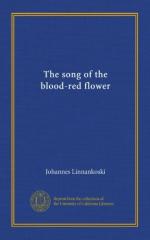The onlookers were filled with admiration and wonder—never had they seen such a dance! Olof took a second partner, then a third; danced a couple of rounds with each, and took a new. He did not lead them to their places after, but slipped each lightly, bowed to another, and whirled her off at the same furious pace.
“What’s come over him now?” whispered the guests.
“He’s going to dance with them all—for the last time, it seems.”
“Ay, it looks like it!” And they laughed and watched the extraordinary scene—after all, it would have been strange if something out of the common had not happened at Olof’s wedding.
Once more Olof set his partner down and bowed to another. Formally this time, as if with emphasis: it was Kyllikki he had chosen now. The girl stood dismayed, uneasy, not knowing what to think.
The fiddler, noting who was the latest choice, pressed his instrument closer under his chin, and put his whole fire into the work. The music swelled and sank, the bridal pair danced lightly and gracefully—sight to see. Once, twice, three times, four times round, and still they danced.
Then as they passed the fiddler for the fifth time, the music suddenly stopped—Olof had snatched the instrument with his right hand as he passed, and next moment it was shivered to a thousand fragments against the table. A single string whined painfully as it broke.
A gasp went up from the onlookers; all stared in amazement at the pair. Neither showed any sign of confusion; they stood easily, as if the whole thing were a prearranged conclusion.
“I hope I haven’t startled anyone,’” said Olof gaily. “But the fiddle that has played my youth away—must play no more! Good-night!”
A sigh of relief and admiration passed through the crowd. What a finish! What a youth! None but he could ever have done the like.
And the guests laughed, and the bridegroom laughed, and old Moisio himself laughed where he sat: “Ay, that’s the way! Turn your back on the rest and give all to one—my daughter’s worth a fiddle at least!”
But the bride was pale—as it might have been one Sunday evening by the river, when she sat alone on the bank, watching a man stride hastily away, with a flush of anger on his cheek.
THE BRIDAL CHAMBER
Footsteps approaching.
A man, with a dark fire smouldering in his eyes, entered in—the pale bride followed him.
The man walked up and down the room with heavy strides, biting his lip and frowning angrily. Suddenly he stopped, and stood by the table against the farther wall, with a cold, piercing glance at the pale-faced girl.
She had been standing silent and thoughtful by the window—now she approached him with hesitant step.
“Olof,” she murmured, her voice quivering with tender anxiety—“Olof—dearest, what does it mean?”




